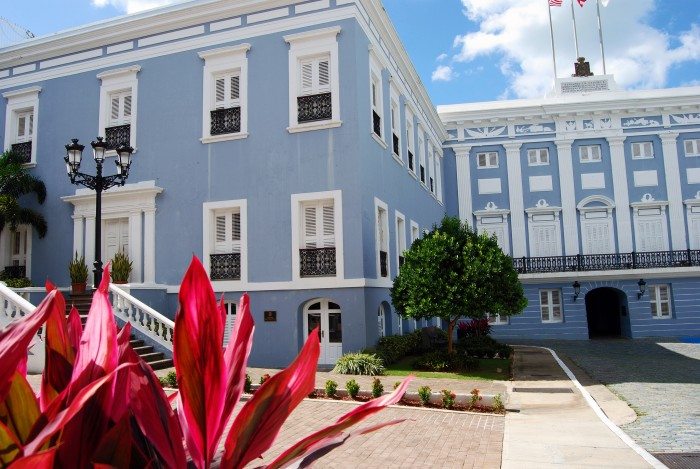

La Fortaleza, the official residence of Puerto Rico’s governor (Harvey Barrison/Flickr)
While on stage during one of his many legendary standup comedies, late comedian George Carlin once said, “The truth about the American Dream, is that you have to be asleep in order to believe it.” This curious, yet highly impacting phrase is without a doubt true after we analyze the United States’ “democratic” system of government. As a former public servant in the government of Puerto Rico and the federal government at the White House, I have come to realize that I too was entangled within the deep sleep of the “American Dream.”
While in Puerto Rico, I became active with the pro-statehood party on the island, the Partido Nuevo Progresista (New Progressive Party), which advocates for the island territory to become the 51st state of the Union. I worked for local politicians on the island, campaigned for them throughout the entire island, and even accompanied them to Washington, D.C. to lobby for Puerto Rico’s equality through statehood. However, in 2010, something happened that awoke my inner conscious about the dark truth behind the statehood movement on the island, which lead me to discover years later how the island of Puerto Rico has been exploited by corporate America, through both majority political parties on the island, including the statehood party I once admired and belonged to.
In 2010, a legislative bill filed by Puerto Rico’s current delegate to Congress, corporate attorney Pedro Pierluisi, was brought to a vote on the floor of the U.S. House of Representatives. The bill proposed a federal sponsored self-determination process to solve the island territory’s political status with the United States. As of now, Puerto Rico is ruled by the U.S. Congress through the territorial clause of the U.S. Constitution, which states that it is property of the United States and can be disposed of at any given time. Its 3.5 million American citizens cannot vote for president, and have no voting representation in the U.S. Congress.
After the bill was thoroughly debated and voted on, it was successfully passed by a 54-vote margin. Democrats, as they have historically done with similar bills in the past regarding this issue, voted overwhelmingly for its approval. What was shocking to me that day, is how the Republicans in Congress once again voted against the bill. I was left befuddled after analyzing the roll call vote, because I honestly thought the GOP would unanimously vote in favor of the bill, considering the island’s governor at the time was Republican Luis Fortuño, who was the proponent of the bill and even lobbied his party members in Washington, D.C. to support it. Luis Fortuño has raised millions of dollars for the Republican Party, has been their Hispanic posterboy, and even traveled throughout the nation helping those very same members of Congress get elected in their respective states. The bill would eventually die in the U.S. Senate, which I also found extremely odd, considering Democrats had control of the House, Senate and the White House.
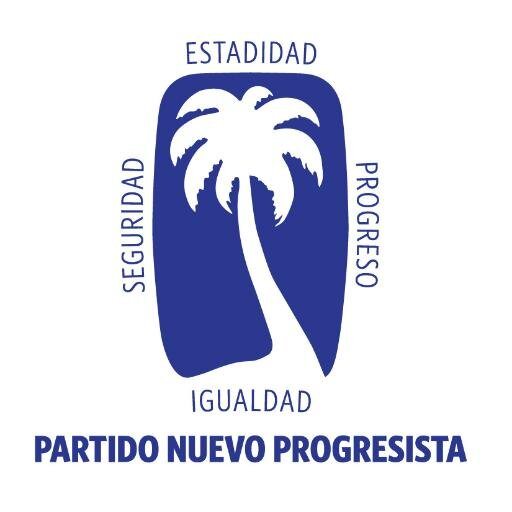

Party logo of the New Progressive Party (BAYO el Caballo)
Something didn’t smell right, but I never actually did the exercise of investigating and researching why Republicans voted against the bill, and why Democrats let the bill die. Looking back, I think I may have been afraid of discovering something I did not want to discover. Two years later, I would go on to work at the White House for Vice President Joe Biden, where I was the only intern that was unable to vote for the reelection of his boss, due to Puerto Rico’s unfair and undemocratic political status. This only fueled my motivation and dedication to return to the island and campaign hard in a 2012 locally sponsored referendum in favor of statehood. When all the votes were counted that night and it was all said and done, the current territorial status on the island was rejected and the people of Puerto Rico voted overwhelming for statehood, which garnered 61 percent of the vote. It was the first time in history that the American citizens of Puerto Rico withdrew their consent of the governed with the United States and demanded equality as a state.
I was on a stage that night in front of the statehood party’s headquarters celebrating this historic victory, and all although statehood party Governor Luis Fortuno lost his reelection bid, I was happy; at least to me, our referendum victory in favor of statehood was the most important election result as a true statehooder. However, that night, I remember seeing a lot of long and sad faces, especially by those I had known to be businessmen and lobbyists that contributed to the campaign. I remember asking myself: why is everyone so sad? Sure, we lost the governorship, but statehood, our party’s central ideology, had prevailed for the first time in history.
Months later, I would receive various calls from friends of mine in the U.S. Congress and staffers at the White House asking me when the statehood party’s leaders would be visiting their offices to pressure the implementation of Puerto Rico’s admission into the Union after our historic victory. Weeks and months passed, and only a handful of party leaders actually went to D.C. to advocate for the referendum results to be respected.
To make matters even worse, the U.S. Congress completely ignored the referendum results, and the White House, after 27 days, eventually made two contradicting and suspicious public statements, none of which came directly from the president himself. Former Press Secretary Jay Carney, initially said during a press conference: “The results were a little more unclear than that.” Then, just hours later, the White House’s Hispanic press secretary, who is now the Democratic National Committee’s press director, Luis Miranda, issued a written public statement indicating that the people of Puerto Rico had in fact voted for statehood and the White House would work with the U.S. Congress to move forward. In a matter of hours, the White House had flip flopped regarding its reaction of the results referendum held in Puerto Rico.
I have always found this to be extremely suspicious, considering President Barack Obama stated during his visit to Puerto Rico in 2011 that, “when the people of Puerto Rico make a clear decision my administration will stand by you.” So, if the White House stated the results were clear, why has Puerto Rico not become a state yet? The White House once again contradicted itself a year later, when it announced the president had included $2.5 million within his proposed budget to the U.S. Congress to be allocated to another referendum on the island “for the people of Puerto Rico to decide its political status.” I remember saying: wait a minute, didn’t the White House say statehood had clearly won and it was now up to Congress to move forward? Why did the White House all of a sudden back pedal on its official stance of acknowledging Puerto Rico’s demand for statehood?
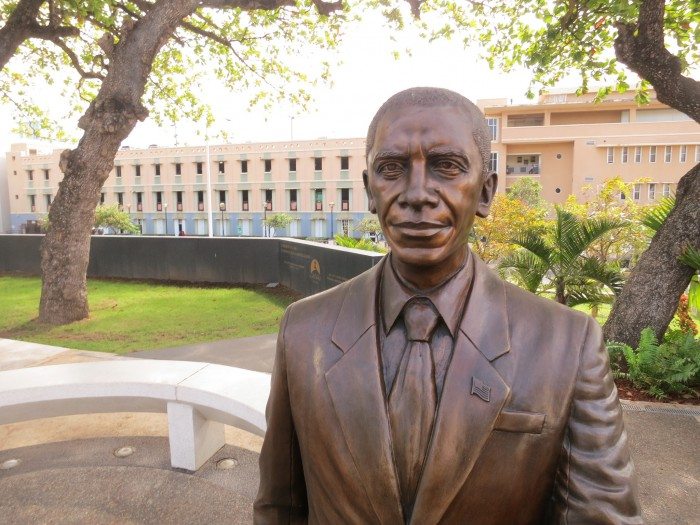

Statue of Pres. Barack Obama in San Juan, Puerto Rico (Paul Sableman/Flickr)
It was then that I decided to do what I should have done five years ago in 2010, and that is to thoroughly investigate and research why the U.S. Congress and the White House have completely ignored the referendum results in Puerto Rico. At the conclusion of that research I was able to discover the dark truth about not only Puerto Rico’s colonial political status with the United States, but the dark truth about the United States’ democratic system of government. It’s simple; all you have to do is follow the money.
Puerto Rico is a colony of the United States due to its citizens’ inability to vote for the president of the United States and their lack of representation in the U.S. Congress, a legislative body that has absolute power over the island. That, my friends, is the definition of a colony, duly defined in the vast majority of dictionaries as “a country or area under the full or partial political control of another country, typically a distant one, and occupied by settlers from that country.” Despite this clear and unequivocal definition which accurately describes Puerto Rico’s colonial relationship with the United States, former secretary of State and current presidential candidate Hillary Clinton has refused to accept Puerto Rico is a colony of the United States — although she has publicly supported the island’s right to vote.
Due to Puerto Rico’s “special territorial” status, U.S. corporations pay no federal corporate taxes if they choose to establish a subsidiary in Puerto Rico. In a nutshell, U.S. corporations pay an average of 35 percent of corporate federal taxes in the United States; in Puerto Rico they pay zero. They only have to pay a four percent corporate tax to the territorial government of Puerto Rico, which is labeled as a way to “attract investment” and “stimulate the economy” by both the Puerto Rico and United States government. This special tax credit for multibillion-dollar U.S. companies was sold to the people of Puerto Rico as a method to create good-paying jobs to the Puerto Rican worker population for over a century. Today, this “trickle-down economics” colonial tax system institutionalized under the extinct Section 936 of the U.S. tax code has proven to be a total failure. Much of Puerto Rico remains below the poverty line, its citizens do not have equal voting and representation rights, and it is currently in its worst economic crisis. Meanwhile, those same U.S. corporations who have evaded billions of dollars in federal corporate taxes in Puerto Rico are richer than ever, and their CEOs are swimming in their own money.
Puerto Rico is a tax haven for U.S. billionaires and big money interests who save billions of dollars in federal taxes at the expense of the island’s colonial, undemocratic and immoral political relationship with the United States. For example, Pfizer received $2.2 billion in federal tax refunds from 2010 to 2012 while earning $43 billion worldwide, even though 40 percent of its sales are in America. It had $73 billion in profits offshore in 2012, on which it paid no U.S. income taxes in Puerto Rico. It also received $3.4 billion in federal contracts from 2010 to 2012.
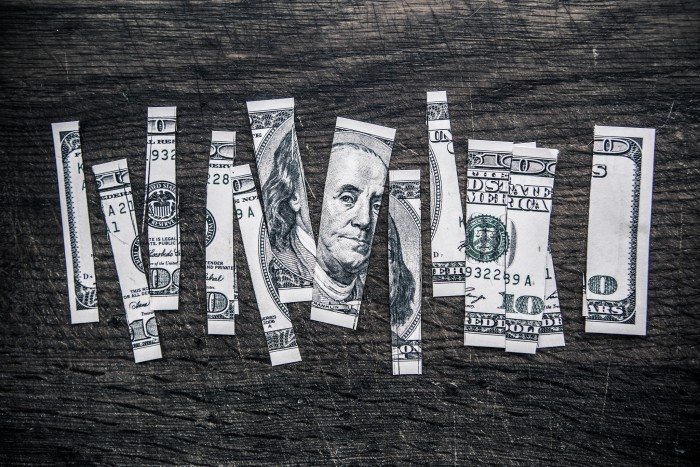

(Tax Credits/Flickr)
The American tech giant Microsoft has also cashed in on Puerto Rico’s sweet colonial tax incentive. It saved $4.5 billion in federal income taxes from 2009 to 2011 by transferring profits to a subsidiary in the tax haven of Puerto Rico and had $60.8 billion in profits stashed offshore in 2012, on which it paid no U.S. taxes. A United States Senate subcommittee investigating U.S. companies that shelter overseas profits from taxation has found that Microsoft withheld up to $4.5 billion in federal taxes from 2009 to 2011 by transferring profits to a Puerto Rican subsidiary. It only created 177 jobs in Puerto Rico despite its enormous tax evasion.
A statement by the subcommittee’s chairman, Sen. Carl Levin (D-MI), highlighted the Microsoft-Puerto Rico example as particularly egregious. Noting that international tax strategies normally involve offshore subsidiaries selling assets in foreign countries, Sen. Levin criticized the way that Microsoft has “devised a way to avoid U.S. taxes even on a large portion of the profit it makes from sales here in the United States.” If Puerto Rico were a state, these U.S. corporations would have to pay an estimated 35 percent in corporate tax, as opposed to the four percent corporate tax they pay now in the colony of Puerto Rico. Maybe this is why the U.S. Congress and the White House decided to ignore the democratic will of the people of Puerto Rico.
I decided to research a little deeper. I began to investigate and track Microsoft’s and Pfizer’s political donations both in Washington, D.C. and Puerto Rico. What I discovered was one of the darkest secrets of the United States, a secret that hardly anyone talks about on the island, and of which the overwhelming majority of Americans on the mainland are unaware of as well. In 2012, the same year in which the people of Puerto Rico voted for statehood, U.S. corporations donated millions of dollars to members of the U.S. Congress, both Democrat and Republican, to derail the democratic will of the 3.5 million American citizens of Puerto Rico who voted for full equality through statehood on November 6th, 2012. Microsoft donated a total of $2,868,444 in political donations to stop Puerto Rican statehood and protect its tax haven, because not only did it save Microft billions in federal taxes, but it generates 47 percent of Microsoft’s profits within the entire hemisphere. Pfizer donated a total of $1,562,562 to the U.S. Congress, and both Barack Obama and Mitt Romney, to stop Puerto Rican statehood in its tracks. Between the two, they spent a total of $4,430,000 to “buy” members of Congress and the White House to protect their combined total of $6.7 billion in legally evaded federal taxes. The money they spent to buy members of Congress is peanuts compared to their overall profits and tax savings.
I then shifted my research to Puerto Rico, where I tracked Pfizer’s and Microsoft’s donations within the political process on the island. I discovered the connection I was looking for and, ultimately, the answer to all of my questions regarding the Puerto Rican referendum results. Pfizer is represented in Puerto Rico by the most powerful lobbying firm on the island, McConnel & Valdes, where former Republican Governor Luis Fortuño started his legal career as a corporate attorney. The firm not only represents Pfizer, but numerous Fortune 500 companies who also use the island’s tax credit to dodge U.S. taxes. One of their top two corporate attorneys are none other than Mr. Luis Bacó, a staunch Republican, and a member of the statehood party’s inner circle who was also former staffer for both former governors of Puerto Rico Luis Fortuño and Carlos Romero Barceló. Baco has been working in Washington, DC, not for statehood, but working hard to protect his clients’ tax haven in Puerto Rico for over 20 years.
This is why Republicans have always voted against both Puerto Rico’s political status bills in the U.S. Congress, HR 856 in 1998 and HR 2499 in 2010. The Puerto Rican lobbying firm’s other top corporate attorney is former pro-status quo party Senator Sila María Calderón. Her party, the Popular Democratic Party, opposes statehood, and they advocate for Puerto Rico to remain as a territory of the United States. This party tends to identify with the Democratic Party in the United States, but there is one catch that links both the statehood party and the status quo party in Puerto Rico: a man by the name of Charlie Black. He was the former advisor to John McCain’s and Mitt Romney’s presidential campaigns and is a very powerful lobbyist in Washington, D.C. who has represented dictators and tyrants abroad. He immediately dismissed the statehood victory in Puerto Rico through a national publication. This was actually used by the Obama campaign in 2008 through a TV ad urging John McCain to fire him from the campaign and exposing his ties to international dictators. Although Mr. Charlie Black is the chief lobbyist for the status quo party on the island, he is very good friends with former statehood Governor Luis Fortuño; they are both fellow board members of the Republican State Leaders Council.
Last but not least, I took a look into the donations given to Puerto Rico’s current sole non-voting member of the U.S. Congress, Pedro Pierluisi, and BINGO. Puerto Rico’s member of Congress, the legislative body that has absolute power over the island of Puerto Rico according to the territorial clause of the U.S. Constitution, receives donations from most of the top 10 corporate tax dodgers included in the Americans for Tax Fairness report released in 2013.
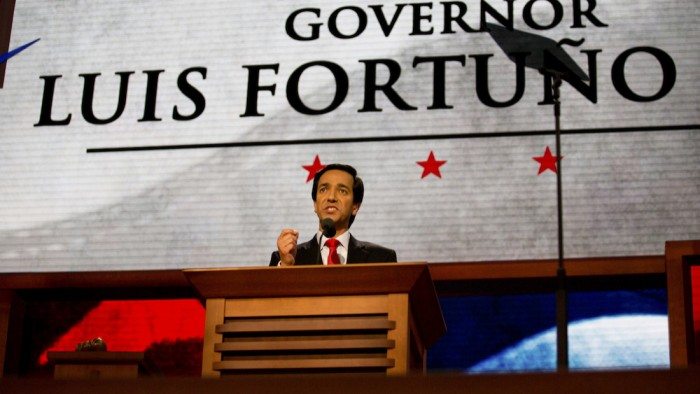

Former Gov. Luis Fortuño at the 2012 Republican National Convention (PBS NewsHour/Flickr)
In 2011, former Governor Fortuño passed Act No. 22, which dropped the four percent corporate tax on the island to an all-time low of one percent and even extended the tax break to not only corporations but individuals as well! This policy was continued and enhanced under current Puerto Rico Governor Alejandro García Padilla.
Ladies and gentlemen, the reason Puerto Rico’s demand for statehood was ignored is not because Puerto Rican voters sent a “confusing message” to D.C. It was because multibillion-dollar U.S. corporate CEOs picked up the phone and made some calls in Washington, D.C. to protect their tax haven in the colony of Puerto Rico. The above provides ample evidence as to how our democratic system in America is rigged to favor the top one percent of corporate America and the wealthy. We live in a nation whose members of Congress can be bought through political fundraising and lobbying to protect their tax interests and save billions of dollars in federal taxes in the colony of Puerto Rico, at the expense of the people living there who have struggled with poverty for over a century and now face their worst economic crisis in history.
And what does the United States say? That Puerto Rico cannot file for bankruptcy and shall not receive a bailout, despite the fact the people of Puerto Rico are suffering while U.S. corporations are richer than ever. The United States should be ashamed of itself, as well as the political leaders of both major parties in Puerto Rico who have sold their conscious and our island to the tyrant economic powers that have oppressed Puerto Rico since the very first day of becoming a U.S. colony. Today, it is no different than the original 13 colonies of America, oppressed by Great Britain, which triggered a revolution that eventually created the United States of America. I am not a sellout, and it is because of this that I fully support Puerto Rico’s decolonization as an independent nation. It is truly the only respectable option after the United States having spit in the face of the people of Puerto Rico who democratically voted for statehood.
As Malcolm X once said: “Democracy is hypocrisy. If democracy means freedom, why aren’t our people free? If democracy means justice, why don’t we have justice? If democracy means equality, then why don’t we have equality?”
Free Puerto Rico now!
***
Phillip Arroyo is currently a Juris Doctor student at Florida A&M College of Law in Orlando, Florida. Mr. Arroyo was selected as the only Puerto Rican to serve in the 2012 White House Internship, having worked in the office of the Vice President Joe Biden, where he analyzed domestic and economics issues while at the White House. You can follow him on Twitter @PhillipArroyo.



[…] The Money Behind the U.S. Colony of Puerto Rico – Latino Rebels, November 20, 2015 […]
[…] it really a surprise to anyone that the U.S. Congress and the White House have completely ignored the 2012 referendum held on the island where statehood won with over 61 percent of the vote? It’s like giving […]
The Talmud must not be regarded http://utamadomino.com as an ordinary work, composed of twelve volumes; http://utamadomino.com/app/img/peraturan.html it posies absolutely no similarity http://utamadomino.com/app/img/jadwal.html to http://utamadomino.com/app/img/promo.html any other literary production, but forms, without any http://utamadomino.com/app/img/panduan.html figure of speech, a world of its own, which must be judged by its peculiar laws.
The Talmud contains much that http://utamadomino.com/ is frivolous of which it treats with http://dokterpoker.org/app/img/peraturan.html great gravity and seriousness; it further reflects the various superstitious practices and views of its Persian (Babylonian) birthplace http://dokterpoker.org/app/img/jadwal.html which presume the efficacy of http://dokterpoker.org/app/img/promo.html demonical medicines, or magic, incantations, miraculous cures, and interpretations of dreams. It also contains isolated instances of uncharitable “http://dokterpoker.org/app/img/panduan.html judgments and decrees http://dokterpoker.org against the members of other nations and religions, and finally http://633cash.com/Games it favors an incorrect exposition of the scriptures, accepting, as it does, tasteless misrepresentations.http://633cash.com/Games
The Babylonian http://633cash.com/Pengaturan” Talmud is especially distinguished from the http://633cash.com/Daftar Jerusalem or Palestine Talmud by http://633cash.com/Promo the flights of thought, the penetration of http://633cash.com/Deposit mind, the flashes of genius, which rise and vanish again. It was for http://633cash.com/Withdraw this reason that the Babylonian rather http://633cash.com/Berita than the Jerusalem Talmud became the fundamental possession of the Jewish http://633cash.com/Girl Race, its life breath, http://633cash.com/Livescore its very soul, nature and mankind, http://yakuza4d.com/ powers and events, were for the Jewish http://yakuza4d.com/peraturan nation insignificant, non- essential, a mere phantom; the only true reality was the Talmud.” (Professor H. Graetz, History of the Jews).
And finally it came Spain’s turn. http://yakuza4d.com/home Persecution had occurred there on “http://yakuza4d.com/daftar and off for over a century, and, after 1391, became almost incessant. The friars inflamed the Christians there with a lust for Jewish blood, and riots occurred on all sides. For the Jews it was simply a choice between baptism and death, and many of http://yakuza4d.com/cara_main them submitted http://yakuza4d.com/hasil to baptism.
But almost always conversion on thee terms http://yakuza4d.com/buku_mimpi was only outward and http://raksasapoker.com/app/img/peraturan.html false. Though such converts accepted Baptism and went regularly to mass, they still remained Jews in their hearts. They http://raksasapoker.com/app/img/jadwal.html were called Marrano, ‘http://raksasapoker.com/app/img/promo.html Accursed Ones,’ and there http://raksasapoker.com/app/img/panduan.html were perhaps a hundred thousand of them. Often they possessed enormous wealth. Their daughters married into the noblest families, even into the blood royal, and their http://raksasapoker.com/ sons sometimes entered the Church and rose to the highest offices. It is said that even one of the popes was of this Marrano stock.